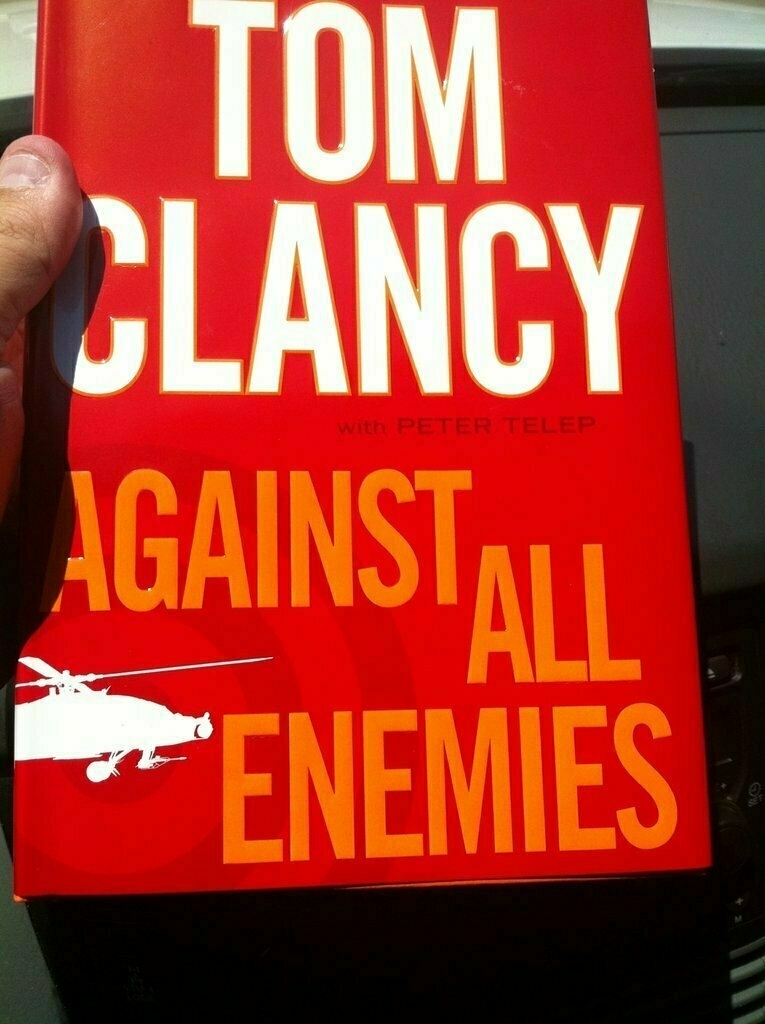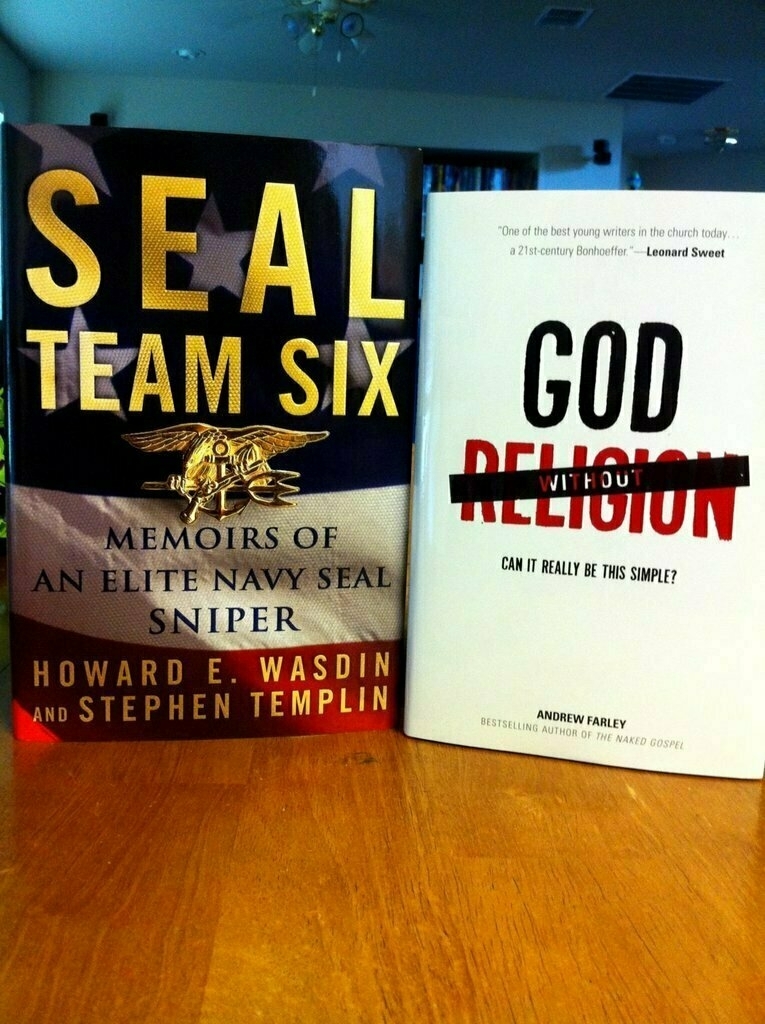read
Retrophisch Review: Wolf Trap
I’m behind on my book reviews, so here’s looking back at my first read of the year. Consequently, my first six books of the year were all Advance Reader Copies (ARCs), and they started with a bang in Connor Sullivan’s Wolf Trap. That shouldn’t be surprising, since his Barry Award-winning debut, Sleeping Bear, was absolutely terrific. Wolf Trap features a different set of protagonists than Sleeping Bear, but I do hope he revisits the first novel’s characters in the future.

Here, Brian Rhome is working the ski slopes in Montana, wrestling with his personal demons, and contemplating suicide. When the current president’s green energy plans are sabotaged, Rhome is recalled to his former life—the one responsible for all those aforementioned demons—in CIA’s Ground Branch. For not only have the president’s plans, and the new power plants connected to those plans, been sabotaged, but a larger threat looms that requires Brian’s particular set of skills.
Wolf Trap is certainly a different kind of thriller than Connor’s debut, and truth be told, it took a little while for me to get over that particular hang-up. Once I got past that, however, everything fell into place and this reader was off to the races. Which is something our hero Brian is doing as well, racing around the globe to thwart the schemes of the man responsible for those demons which had Rhome contemplating stepping off a cliff when we first met him.
Sullivan doesn’t get bogged down with any details on the green science involved, delivering just what’s needed for the reader to understand what’s going on, and what the stakes are. While Rhome isn’t an everyman in the sense that not all of us have served in the CIA’s covert teams, he is in that we can all relate in some way to the loss and pain he grapples with, making it very easy to root and care for him. Connor definitely has another hit on his hands, and thriller readers should dive into Wolf Trap if they haven’t done so already.
4/5 phins, a solid sophomore release
Amazon: Kindle, Hardcover
Barnes & Noble: Hardcover
Indiebound: Hardcover
Retrophisch Review: Fields of Fire
 The best conspiracy theories contain an element of truth, and the best novels containing conspiracies do as well. Such is the case with Ryan Steck’s Fields of Fire, the debut novel from the founder of The Real Book Spy, one of the Web’s go-to resources for thriller lovers.
The best conspiracy theories contain an element of truth, and the best novels containing conspiracies do as well. Such is the case with Ryan Steck’s Fields of Fire, the debut novel from the founder of The Real Book Spy, one of the Web’s go-to resources for thriller lovers.
Matthew Redd is doing not only what he loves, but something he is good at as well: being a Marine Raider, part of the tip of the spear that is America’s special operations forces. With nods to the characters of Vince Flynn, Lee Child, Brad Taylor, and others, Redd is a hard-charging Marine with a heart of gold, both thanks to his adoptive father, J.B. But while gearing up for the takedown mission of a scientist-terrorist, Redd is deceived by the person he helps out on the side of the road, and the result is his being disgracefully drummed out of his beloved Corps. To make matters worse, he emerges from the stockade to find out J.B. has died.
Redd sets off to his home in Montana, to the small town and open spaces he hasn’t been around in for close to a decade. He finds himself at odds with his neighbor, the son of a BigTech billionaire, learns his high school sweetheart has returned, and can’t square the messages he’s getting about J.B.’s death with the man himself. Not getting any help from local law enforcement, Redd sets out to get answers using the skills taught to him by J.B. and the Marine Corps.
Ryan Steck enters an already crowded thriller field, but brings something fresh and new in the story of Matty Redd. As not only a lover of the thriller genre, but a student, Steck has learned his lessons well and crafted a solid debut. Incorporating bits of real life, such as the Georgia Guidestones and Bill Gates buying up farmland, albeit in this case his fictitious tech billionaire being the buyer, Steck weaves a conspiracy of global proportions into the rough-and-tumble locale of Big Sky life in Montana.
Steck signed a two-book deal with his publisher, and the next novel is easily but convincingly set up at the conclusion of this one. As an adoptive father myself, I could feel J.B.’s pain and pride as Redd recounted lessons his dad had taught him. I also enjoyed the carefully-laid plot twist. If you are a lover of the thriller genre, this is a great read to add to your library.
4/5 phins, a solid debut
Amazon: Kindle, Hardcover
Barnes & Noble: Hardcover
Indiebound: Hardcover
Today’s @halfpricebooks find: large paperback edition of @wardlarsen’s first David Slaton book. Perfect for the re-read I have planned. (It’s been a long while.)

I have done something similar, with authors I know on Twitter, or have met in person. Given his productivity, @robkroese pretty much has his own shelf. twitter.com/David_JWe…
At long last, my review of @TheJasonAnspach and @RealNickCole’s Forgotten Ruin: https://www.retrophisch.net/2022/07/26/retrophisch-review-forgotten.html
tl;dr: Do you like fantasy/D&D/Tolkien? Do you like military thrillers? If so, buy this, you won’t regret it.
Retrophisch Review: Forgotten Ruin
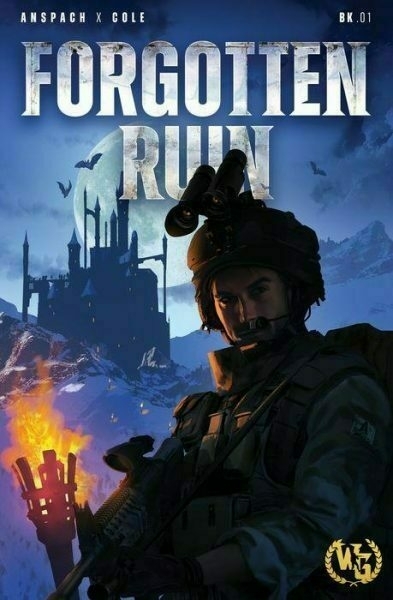 Let’s be clear about one thing right up front: I fully admit I am not an impartial reviewer of this book. Please allow me to explain.
Let’s be clear about one thing right up front: I fully admit I am not an impartial reviewer of this book. Please allow me to explain.
My interests when it comes to reading fiction, like many, took a meandering path through my formative years. Thanks to Star Wars—yes, that was the name of the movie when it came out, none of this retcon naming nonsense—on the big screen when I was six, science fiction was an early staple of my childhood reading. When I was in seventh grade, I came down with chicken pox. Looking forward to a couple of weeks home from school, I sat in the car while my mother went into the school to talk with the front office about getting assignments from my teachers. Then, and God bless her for this amongst so much more, Mom went down the hall to the library, to get me a couple of books. After a discussion with the librarian about what I liked, she came back out with a set of books that changed my life in many ways: Tolkien’s The Hobbit, and The Lord of the Rings.
When I was 15, my dad brought home a paperback from a debut novelist: Tom Clancy’s The Hunt for Red October. Like Star Wars and The Lord of the Rings before it, this was another pivotal moment in expanding my reading horizon. These three still remain to this day: science fiction, fantasy, and thrillers. Oh, and did I mention that thanks to Tolkien and being at a middle school full of other nerds, I started playing Dungeons & Dragons? Well now I have.
So when a novel comes along that combines two of these elements, the military thriller, with fantasy/D&D, and does so very, very well, it is a no-brainer that I am going to love it. And such is the case with Forgotten Ruin.
Take a crack Army unit, throw them a few thousand years into our future, into a Europe disfigured and rearranged by a cataclysmic event which led to the very rearranging of DNA amongst the populace, so that races previously thought of as only fantasy, elves and orcs, are now a reality, and have these Rangers deal with it. Authors Jason Anspach and Nick Cole bill it as “Tolkien meets Shock and Awe.” They have crafted a real gem from a firecracker of an idea, and the execution is flawless from start to finish.
The story is told through Talker, a Ranger-come-lately. Talker is called Talker by the other Rangers because he’s a translator, speaks lots of languages, and not knowing exactly what situation the spec ops units being sent forward in time might encounter, the higher-ups figured it might be good to have some folks attached who can help out in case our heroes end up in a non-English-speaking realm. What the higher-ups don’t account for, as we learn from Talker, is just how far in the future they end up.
Ever wonder what the Battle of Helm’s Deep might have been like if Aragorn, Legolas, Gimli, Théoden, and the Rohirrim had machine guns to use against Saruman’s horde? You’ll get a taste of that and more in Forgotten Ruin. And what about the other units that went through, what happened to them? Talker and his Ranger buddies learn some lessons about them the hard way and seek not to repeat others.
The world Anspach and Cole have created, that of a modern military unit being cast into a medieval-style past/future/alternate reality, is nothing new under the sun, but their choices and execution of same render this nothing short of a masterpiece in the space. Is that too gushing of a sentiment? Tough. I told you at the outset I could not be impartial with this one.
Simply put: if you love military thrillers, if you love sword-and-sorcery fantasy, you will love Forgotten Ruin. Grab yourself a copy, Ranger Up with Talker and the gang, remember to Be Meaner Than It, and enjoy a great read.
5/5 phins
Amazon: Kindle, Paperback Barnes & Noble: Paperback IndieBound: Paperback
Retrophisch Review: The Outside Man
In his debut novel, Don Bentley introduced the world to Matt Drake, a new kind of thriller hero, yet one still recognizable to fans of the genre. Without Sanction was a runaway bestseller, and I was glad to have followed the advice of so many on social media and give it a read. Drake takes the next step on his journey in the follow-up, The Outside Man.
I’ll be honest: I loved this book. In a private message exchange, I told Bentley I thought this was his Empire Strikes Back to the Star Wars of Without Sanction. The first novel sets the stage, but this one 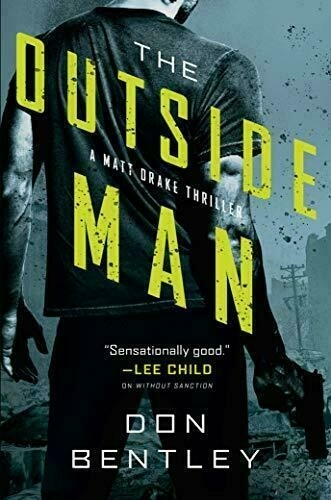 turns the volume all the way to 11 and takes Matt Drake, and his creator, to the next level.
turns the volume all the way to 11 and takes Matt Drake, and his creator, to the next level.
After the events of the first book, this one opens with Matt being ambushed in broad daylight, on the streets of Austin, Texas, no less. There is a terrorist with a score to settle against Drake, backed up by professionals from the Middle East. Our hero manages to survive, but the ambush provides more questions than answers, and Drake is once again plunged into a world he thought he was desperate to leave, but finds his soul needs for him to truly be a part of. The villain we caught whispers of in Without Sanction is fully revealed here, and he is formidable. Worse, he knows exactly where to hurt Matt Drake the most.
One of the things I appreciate about Drake, and Bentley’s writing of him, is that he is fully human. He gets hurt, wounded, injured, and those have real-world consequences that affect how Matt continues his mission. Coupled with his vow to rescue an innocent from a sex-trafficking ring, and his snarky sense of humor, on more than one occasion one is left wondering, “Just how is Matt going to get out of trouble this time?“ As a thriller author, this is exactly what you want in your toolbox, to keep your readers on their toes and guessing what’s next.
Without Sanction was a firm entry into the thriller genre for Don Bentley, but The Outside Man vaults him into the band of my must-read authors, joining Daniel Silva, Mark Greaney, Lee (and now Andrew) Child, Nick Petrie, and Jack Carr. If you’re a fan of the genre, or just someone looking for a great read, The Outside Man is a must-buy.
5/5 fins
Retrophisch Review: The Sentinel
Much has been made of the latest Jack Reacher novel, The Sentinel, due to its collaborative nature between Lee Child and his brother, Andrew Child neé Grant. After 24 Jack Reacher novels, Lee Child felt it was time to step away from the yearly grind of write, publish, promote, and begin enjoying a well-deserved retirement. However, knowing the love fans have for Reacher, Child didn’t want to simply end the series, and enlisted his brother Andrew Grant to take up the mantle. The Sentinel is the first of three planned collaborations before Andrew takes on the series solo.
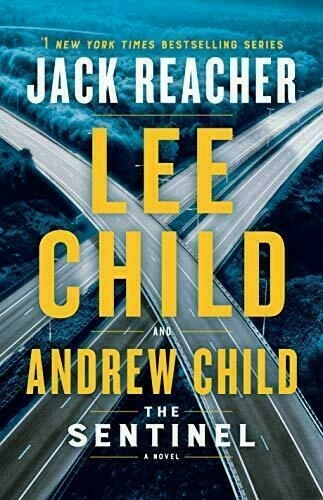 I discovered Jack Reacher—Child’s former Army MP now wandering vigilante—three years after the first book, Killing Floor, was published. I quickly blew through Killing Floor, Die Trying, and Tripwire, and began, like so many other readers, the annual wait for a new Jack Reacher novel to devour. While there are some notable differences with The Sentinel from prior Reacher tomes, devouring this one was no different from the rest.
I discovered Jack Reacher—Child’s former Army MP now wandering vigilante—three years after the first book, Killing Floor, was published. I quickly blew through Killing Floor, Die Trying, and Tripwire, and began, like so many other readers, the annual wait for a new Jack Reacher novel to devour. While there are some notable differences with The Sentinel from prior Reacher tomes, devouring this one was no different from the rest.
Reacher takes himself to Nashville, to listen to good music, which in and of itself is a nod to Reacher’s past, as well as Lee Child’s as Reacher’s creator. The reason Reacher ends up in Margrave, Georgia in Killing Floor is he’s seeking out the home town of a blues man he likes. Reacher, being Reacher, gets involved in sticking up for the little guy in helping a local band, and finds he quickly needs to leave town. He ends up not too far away in Pleasantville, Tennessee. On the streets of the town completely by chance when a daylight abduction is attempted, Reacher thwarts the kidnapping and gets involved in a matter that runs deeper than it first appears, one with implications reaching far beyond the town itself.
There is certainly a different feel with The Sentinel from previous Reacher novels, the result of the collaboration between the brothers. Some reviewers have complained about the tone, or that there is too much expository from Reacher. I didn’t notice much of a change in that regard. As usual, there is ample opportunity for Reacher to say nothing. What stood out to me is that the novel didn’t feel as tight as previous efforts. One of the many things that has made the Reacher novels so popular is that Child’s writing style was as sparse as the main character’s wardrobe. It was a perfect marriage of style and character, and there is something of a departure from that in this latest book.
Nevertheless, I did not find it distracting to the point of losing enjoyment. Reacher is still sticking up the little guy, still mucking up the best-laid plans of those who wish ill on others, still being, well, Reacher. This was a learning process for the brothers, and I expect the next two Reacher novels will get better and better as Andrew establishes himself as the main author in taking on the sole responsibility for an annual Reacher story. While The Sentinel won’t vault into my Reacher top five, it is a solid entry in the Jack Reacher universe.
4/5 fins
Retrophisch Review: The Man Who Never Was
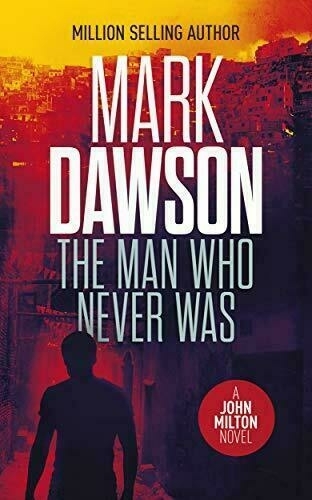
Which brings us to The Man Who Never Was, the 16th novel in the John Milton series. Milton, who frequently goes by the nom de guerre John Smith, is formerly of Her Majesty's Special Air Service, and the ultra-black and, so far as we know, entirely fictitious Group Fifteen. Tormented by the many dirty deeds he did in service to his nation, Milton drops out of the life, gets himself into AA, and now lives attempting to balance the scales. Balancing the scales is foremost in his mind in The Man Who Never Was, where we find Milton going after the drug cartel figures he feels are responsible for the death of a friend. The novel picks up a few weeks after the previous one in the series, Bright Lights. When a damsel in distress turned out to not be entirely who she seemed, it resulted in the death of Milton's friend, Beau Baxter. Now, he wants justice for his friend, and it goes beyond the man who pulled the trigger.
Starting in the night life of Amsterdam, playing the role of an up-and-coming drug distributor, Milton, with the help of a small cadre of associates, including Beau's son, infiltrates the cartel's network. He manages to wreak a little havoc and find himself face-to-face with the boss herself in the jungles of Colombia. And it's there that Milton learns things really aren't what they seem, and the tension and action ratchet up.
If you're new to the John Milton novels, I would not recommend starting with this one. Most of the time, you can pick one up and enjoy it for what it is without having read any of the previous ones, but that is certainly not the case here. To really understand Milton's motivations, some of the characters, and the full weight of the plot, you should read the prior entry in the series. In the case of The Man Who Never Was, it is a solid brick in the John Milton wall, but not a must-read like some of the others. At some points of this book, I felt like Dawson wrote it simply because he felt he had to, due to the way he'd left things at the end of Bright Lights. Nevetheless, I enjoyed it, and cannot wait for the next John Milton adventure.
3.5/5 fins
Retrophisch Review: Savage Son
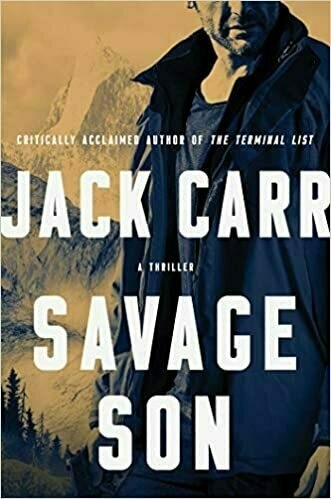 The third book featuring Jack Carr's protagonist James Reece is indeed his best yet. It's a must-read for anyone who is a fan of the thriller genre.
The third book featuring Jack Carr's protagonist James Reece is indeed his best yet. It's a must-read for anyone who is a fan of the thriller genre.
After the events of The Terminal List and True Believer, Reece finds himself Stateside, beginning to carve out a new life for himself. Taken in as a second son by the Hastings family, and being courted by the Special Operations Division of the CIA, Reece has options. He also has an agenda of his own, and his thought process is to align those with continuing in service to his nation. What he doesn't know is that he is in someone else's crosshairs, and things get wild when the hunter becomes the hunted.
Hunting is the main theme of the book, which is an homage to Richard Connell's The Most Dangerous Game. Carr has stated in numerous interviews that Savage Son is the book he's always wanted to write, but knew it couldn't be the first book he wrote. As with his previous novels, Carr brings his own experience as a 20-year veteran of the Navy SEALs to the text, and adds his love of the outdoors and hunting game. As he is hunted by the Russian mob and elements of Russian intelligence, Reece and his adopted family must find a way to turn the tables.
I've heard Jack speak at two book signings, and I follow him on social media. He is not shy about showering praise and gratitude on authors he feels taught him how to write books such as these: David Morrell, Daniel Silva, John Le Carré, Louis L'Amour, Truman Capote, and Nelson DeMille, to name but a few. With Savage Son, I would say Carr has clearly taken the best of what he has learned from these masters and poured it into his work. You can sense the progress as an author from The Terminal List, through True Believer, to now. This doesn't read like a third book by a relatively new author, but rather like the 10th or 12th by a seasoned pro.
There are certain authors whose books are automatic purchases for me these days: Lee Child, Daniel Silva, Mark Greaney, Nick Petrie, and Robert Kroese. Jack Carr has definitely joined that list. If you love the works of Brad Thor and Brad Taylor, you will love Jack Carr.
5/5 fins, a must-buy
Retrophisch Review: The Dark Continent
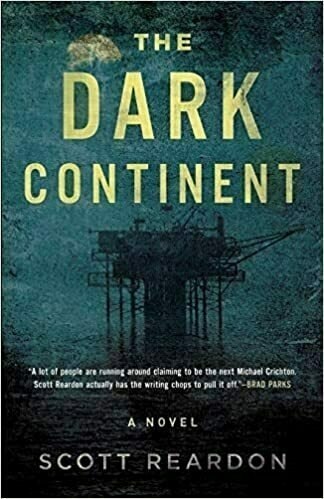 Evoking plot elements from Justin Cronin’s The Passage, Scott Reardon’s The Dark Continent opens with CIA agent Karl Lyons looking for an ultra-black government project gone awry, one he had been a part of but was now on the outs with. The heavily obscured project, Prometheus, has taken a turn for the worse: on an abandoned oil rig off the coast of Alaska, scientists have begun injecting human subjects, and not just any human subjects. These are the worst of the worst: rapists, serial killers, death row inmates. Sound familiar, readers of The Passage?
Evoking plot elements from Justin Cronin’s The Passage, Scott Reardon’s The Dark Continent opens with CIA agent Karl Lyons looking for an ultra-black government project gone awry, one he had been a part of but was now on the outs with. The heavily obscured project, Prometheus, has taken a turn for the worse: on an abandoned oil rig off the coast of Alaska, scientists have begun injecting human subjects, and not just any human subjects. These are the worst of the worst: rapists, serial killers, death row inmates. Sound familiar, readers of The Passage?
Yet Reardon has his own twist on what happens to the test subjects, one that comes across as far more believable than Cronin’s vampires, but is just as terrifying. Defying the odds to escape from Chinese imprisonment, Karl joins forces with Tom Reese, the protagonist from Reardon’s first book, The Prometheus Man. I should note that I hadn’t read this first novel before diving in to The Dark Continent, but it was not an issue. Reardon gives enough backstory from the first book sprinkled throughout the second to get you up to speed and keep you engaged. After the test subjects escape, Karl and Tom must enter the heart of darkness the killers have created in middle America to take down the enhanced humans before they end life as we have become accustomed to it.
This was probably not the best choices of books to read during a pandemic and the inherent fears that go along with one, but I could not put it down. It is a “just because we can do something doesn’t mean we should” thriller that grabs hold of you and doesn’t let go. From the beginning, I was deeply invested in Karl and Tom, and Kronin (a nod to Justin Cronin?) has to be one of the scariest fiction characters since Cormac McCarthy’s Chigurh. Reardon has crafted an engaging, suspenseful story that should make one think while being entertained.
4.5/5 fins, definitely recommended
Retrophisch Review: Last Tango in Cyberspace
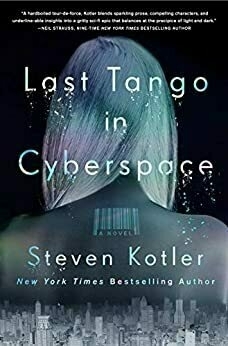
I have heard of Kotler's earlier work, mostly non-fiction, such as The Rise of Superman, Stealing Fire, Tomorrowland, and others, but I have never read these before. That will likely change having finished Last Tango in Cyberspace.
Lion Zorn is a new kind of human, an empathy tracker. His skills allows him to feel the future, spotting trends before they happen. He makes a living giving companies a yes or no about the possible futures they are working on. Lion is hired by a multinational conglomerate named Arctic to help with the possible launch of a new kind of pharmaceutical, but he quickly finds himself investigating a possible murder while ducking the very latest in cutting-edge surveillance.
4/5 phins, recommended
PEBKAC: On Being Locked In, And Getting What I Want Out
This column originally appeared in the January 2012 issue of About This Particular Macintosh.
While I own a Kindle e-reader, I find I still do most of my electronic reading on my iPhone. Whether it’s in the Kindle app, or Barnes & Noble’s Nook app, or Apple’s own iBooks, I always have my iPhone with me, thus, I can always read an e-book, even if I left a dead-tree version, or my Kindle, at home. At any rate, I’ve noticed something about these three reading apps.
Before we get to my observation, a quick word on these apps’ respective libraries and purchasing systems: yes, you are locked in. A Kindle book cannot be read in the Nook app, nor can the Nook book be read in iBooks. And while iBooks books are based on EPUB, Nook’s are based on eReader, and Kindle books are a derivative of the Mobipocket format, all of these are wrapped in digital rights management (DRM) software which is unique to that particular app/vendor. In other words, when you buy a Kindle book, any reading of that book has to be on a Kindle device or app. Forever.
For many folks, this isn’t a problem. They have a long history ordering paper books from Amazon, or buying them at a brick-and-mortar Barnes & Noble, and they’re comfortable continuing to give that company their business. I am one of those people, and I’ve given both of those companies part of my book-buying business over the years. My problem with the whole e-book thing is that, unlike the dead-tree edition of a book, I can’t–with limited exceptions–loan it to a friend, or donate it to a library or other organization when I’m done with it. The other problem is, what if this vendor goes out of business? Or shuts down this component of their business? Sure, that doesn’t sound remotely possible with the three companies in question, but who among us would have thought, fifteen years ago, that Leahman Brothers wouldn’t exist today? Yes, they can take up a lot of physical space, and are susceptible to the elements, but a well cared-for paper-based book may just have a better of chance of making it to the second half of the century.
This is a continuing problem authors, publishers, and readers have to dance around. To not have DRM means books are more easily pirated, and authors lose out on royalties, while publishers’ costs increase. As a content creator myself, I’m fully aware of the need to protect one’s work. Yet at the same time, I’m a content consumer, and I find myself at war within, given that I’d rather have the same easy choice with e-books that I have with paper-based books.
So, to my observation: While reading a book in iBooks, I came across an interesting passage, and I have long been a note-taker. In iBooks, it was no big deal to highlight the passage, copy the text, then paste it into a plain text file on Dropbox with Notesy for future reference. Yet this simple process is not at all possible with the Kindle or Nook apps, should I find an interesting passage while reading within either of them. Oddly enough, to take notes from something I’m reading in the Kindle or Nook apps, I have to revert to the same process I would use if the book in question was paper-based: I’d touch-type the note into a relevant file while reading from the device propped up next to my iMac.
This, on the face, seems like a simple fix: the Kindle and Nook app developers need to include a copy text function. However, knowing several programmers, I know that things are often not nearly as simple as they seem. These developers may also be restricted in some way by Apple’s rules for iOS apps, who can say? Still, I’d love to see them implement this in their respective apps.
But why not just highlight the passage that’s caught your attention, you might ask. Because, so far as the Nook is concerned, this means you’re still stuck always having to flip through the e-book to find what you’ve highlighted. Amazon gets around this somewhat with the Kindle, however, by collecting your annotations. Whether you highlight, or make a note, it’s kept for you at kindle.amazon.com. From there, you can copy and paste directly from a web page, which is a reasonable alternative to doing it bit by bit on your iPhone.
The only issue with that solution on the Kindle, however, is what if you have a book you didn’t buy from Amazon? In the week between Christmas and New Year’s, I downloaded a novella from an author’s blog. He had put it out as both a .mobi file for reading on a Kindle, or EPUB for apps and devices capable of that format. I can put this .mobi file on my Kindle, and highlight all I want, but those won’t be available to me at the above web site. Built-into-the-app copy abilities would help solve that. Because you never know when an interesting passage is going to come along.
Resisting the tide
Daniel Silva’s latest Gabriel Allon thriller, Portrait of a Spy, dropped today. As always, Silva is tuned in to the real goings-on of the world, where his fiction tap-dances on the edge of:
Another article of faith lay in tatters that November—the belief that Europe could absorb an endless tide of Muslim immigrants from its former colonies while preserving its culture and basic way of life. What had started as a temporary program to relieve a postwar labor shortage had now permanently altered the face of an entire continent. Restive Muslim suburbs ringed nearly every city, and several countries appeared demographically fated to Muslim majorities before the end of the century. No one in a position of power had bothered to consult the native population of Europe before throwing open the doors, and now, after years of relative passivity, the natives were beginning to push back. Denmark had imposed draconian restrictions on immigrant marriages. France had banned the wearing of the full facial veil in public. And the Swiss, who barely tolerated one another, had decided they wanted to keep their tidy little cities and towns free of unsightly minarets. The leaders of Britain and Germany had declared multiculturalism, the virtual religion of post-Christian Europe, a dead letter. No longer would the majority bend to the will of the minority, they declared. Nor would it turn a blind eye to the extremism that flourished within its midst. Europe’s age-old contest with Islam, it seemed, had entered a new and potentially dangerous phase. There were many who feared it would be an uneven fight. One side was old, tired, and largely content with itself. The other could be driven into a murderous frenzy by a doodle in a Danish newspaper.
Nowhere were the problems facing Europe on clearer display than in Clichy-sous-Bois, the volatile Arab banlieue located just outside Paris. The flashpoint for the deadly riots that swept France in 2005, the suburb had one of the country’s highest unemployment rates, along with one of the highest rates of violent crime. So dangerous was Clichy-sous-Bois that even the French police refrained from entering its seething public housing estates…
Silva’s Gabriel Allon series is one of the best in the modern thriller class, and I encourage readers of the genre to check his work out.
Books 2010: The Year of the Movie Tie-In
Below follows the list of books I read in 2010. Links go to the dead-tree edition (for the most part) on Amazon. You can see this list, as well as past years on the reading page. An asterisk signifies the book was read electronically, most likely on my iPhone. Beginning in May, I started noting the completion date of reading a tome. This doesn't necessarily translate into x amount of time between books being the actual amount of time it took to read a book. There are days where I'm in between books and simply haven't started a new one. Other times, I've got two books going at once (usually one in print, one on the iPhone). I just thought it would be fun to note those dates. Since I began tracking toward the end of 2007, this proved a banner year for my reading. I got through 43 books, graphic novels, and novellas in 2010, and I'm already excited about 2011. I'm currently in the middle of two books (one in print, one on the iPhone), with four more in the queue I can't wait to get to. Traditionally, I've been a heavy fiction reader, and this trend did not change in 2010. I only read five non-fiction books last year, and two of those were memoirs of a sort. What jumped out at me when reviewing the list was how heavy it was with books turned into movies. It starts with Youth in Revolt, recommended and loaned to me by Brent, then moved to Percy Jackson and the Lightning Thief, The Losers, The American, The Town, and True Grit. I'll admit that five of those six were a result of being prompted to read them before seeing the movie, or as a result of having seen it. This amounted to nearly one-seventh of my entire list being tied to a movie. The list is presented in reverse order, so the last book I read is at the top.
- Stupid Christmas – Leland Gregory (12/24) *
- Marching Bands Are Just Homeless Orchestras, Half-Empty Thoughts Vol. 1 – Tim Siedell (illustrated by Brian Andreas) (12/22) *
- True Grit – Charles Portis (12/20)
- Gazelles, Baby Steps And 37 Other Things Dave Ramsey Taught Me About Debt – Jon Acuff (11/30) *
- The Rembrandt Affair – Daniel Silva (11/15)
- The Defector – Daniel Silva (11/10) *
- Moscow Rules – Daniel Silva (11/4) *
- Talking to Girls About Duran Duran: One Young Man's Quest for True Love and a Cooler Haircut – Rob Sheffield (10/30)
- Worth Dying For – Lee Child (10/25)
- On Target – Mark Greaney (10/14)
- The Secret Servant – Daniel Silva (10/11) *
- The Messenger – Daniel Silva (10/1) (2d time reading) *
- Prince of Fire – Daniel Silva (9/24) (2d time reading) *
- The Town (previously published as Prince of Thieves) – Chuck Hogan (9/20)
- The American: A Special Edition of A Very Private Gentleman – Martin Booth (9/14)
- A Death in Vienna – Daniel Silva (9/8) *
- The Confessor – Daniel Silva (8/30) *
- Path of Destruction: A Novel of the Old Republic (Star Wars: Darth Bane, Book 1) – Drew Karpyshyn (8/20)
- The English Assassin – Daniel Silva (8/20) *
- Lost in the Meritocracy: The Undereducation of an Overachiever – Walter Kirn (8/10)
- The Kill Artist – Daniel Silva (8/6) (2d time reading) *
- Red Mars – Kim Stanley Robinson (7/31)
- The Passage – Justin Cronin (7/21)
- The Naked Gospel – Andrew Farley (7/1)
- The Girl Who Kicked the Hornet's Nest – Stieg Larsson (7/1)
- The Girl Who Played with Fire – Stieg Larsson (6/11)
- The Girl with the Dragon Tattoo – Stieg Larsson (6/2)
- 61 Hours: A Reacher Novel – Lee Child (5/21)
- "Midnight in Death", a novella from Three in Death – J.D. Robb (5/19)
- Holiday in Death – J.D. Robb (5/17)
- Addition by Adoption: Kids, Causes & 140 Characters – Kevin D. Hendricks (5/11)
- Vengeance in Death – J.D. Robb (5/7)
- The Losers: Book One (Vols. 1 & 2) – Andy Diggle & Jock (yes, graphic novels count)
- Devil's Keep – Phillip Finch
- The Breach – Patrick Lee
- Abraham Lincoln: Vampire Hunter – Seth Grahame-Smith
- The Last Olympian (Percy Jackson and the Olympians, Book 5) – Rick Riordan
- The Battle of the Labyrinth (Percy Jackson and the Olympians, Book 4) – Rick Riordan
- The Titan's Curse (Percy Jackson and the Olympians, Book 3) – Rick Riordan
- The Sea of Monsters (Percy Jackson and the Olympians, Book 2) – Rick Riordan
- The Lightning Thief (Percy Jackson and the Olympians, Book 1) – Rick Riordan
- I, Sniper – Stephen Hunter
- Youth in Revolt: The Journals of Nick Twisp – C.D. Payne
Thank you, Lord, for books
No offense to ebooks and Kindle, which have their place, but there's no substitute for a book that has an actual history, that takes up space on a shelf, that has been somewhere, strapped to the back of a bike, that was being read in a British boys' school library while Lewis was still teaching at Oxford.
Thank you, Lord, for books. Not just the words, but actual physical books you can hold in your hand and touch and smell, and ponder where they have been and what lives they may have touched.
The Complete Infidel's Guide to the Koran
Jamie Glazov interviews Robert Spencer for FrontPage Magazine, on Spencer's new book, The Complete Infidel's Guide to the Koran (Amazon link). Money quotes:
Spencer: Political correctness would have us believe that the Koran is a book of peace, and that anyone who says otherwise is "bigoted," "hateful," and "Islamophobic." But is it, really? What the Koran really says can easily be verified. If the Koran really curses Jews and Christians (9:30) and calls for warfare against them in order to bring about their subjugation (9:29), it is not "Islamophobic" to forewarn Infidels by pointing this out. It is simply a fact. And it should go without saying that it is not a fact that should move any reader of my book to hate anyone. The fact that the Koran counsels warfare against unbelievers should move readers to act in defense of freedom of speech, freedom of conscience, and the legal equality of all people, before it is too late.
[...]
But most government and media analysts dare not even question the assumption that the Koran is peaceful, for they believe that any insinuation to the contrary is racist, bigoted, and effectively brands all Muslims as terrorists. In other words, they think the implications of the possibility that the Koran teaches warfare against unbelievers are too terrible to even contemplate. Thus, many policymakers simply assume the Koran teaches peace without bothering to study the text. They do this to their own peril -- and ours.


